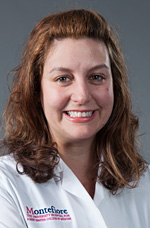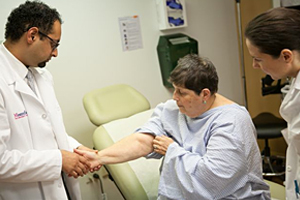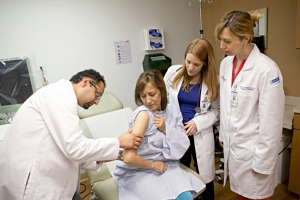

Insights into Skin Cancer
Skin Cancer "Immunity" a Myth for Hispanic Population
As summer approaches, so does the need to heed the preventive measures touted during Skin Cancer Awareness Month in May. Yet despite increasing rates of fatal melanoma diagnoses among Hispanic individuals, this population is still less likely to practice sun-protective behavior, according to findings by researchers at Einstein and its University Hospital Montefiore Medical Center, in collaboration with colleagues at University of Miami Hospital.
 Kate Viola, M.D.Less than half of Hispanic patients surveyed in the study reported that they regularly used sunscreen, wore a hat, or stayed in the shade, although they were already under a dermatologist's care for unrelated skin conditions, such as psoriasis or eczema.
Kate Viola, M.D.Less than half of Hispanic patients surveyed in the study reported that they regularly used sunscreen, wore a hat, or stayed in the shade, although they were already under a dermatologist's care for unrelated skin conditions, such as psoriasis or eczema.
"Our findings suggest that dermatologists may not be doing a good job of educating patients about skin cancer and sun protection, which is quite concerning," said Dr. Kate Viola, a research fellow in dermatology within the department of medicine and lead author of the study.
The study, presented as late-breaking research at the American Academy of Dermatology's annual meeting in March, surveyed more than 1,000 Hispanic patients in dermatology waiting rooms in the Bronx and Miami—the country's two most Hispanic-intensive areas.
While skin cancer is less common in darker-skinned individuals, when it is diagnosed they have a higher risk of late diagnosis with advanced, thicker melanomas and lower survival rates. In addition, a recent report from the Centers for Disease Control (CDC) noted that a higher incidence of melanomas was found in female Hispanics under age 50.
 Dr. Karthik Krishnamurthy performs a total-body skin exam"No one is immune to skin cancer," said Dr. Robert Kirsner, chief of dermatology at University of Miami Hospital and co-author of the study. "Unfortunately, this message is often forgotten in terms of skin cancer and Hispanics."
Dr. Karthik Krishnamurthy performs a total-body skin exam"No one is immune to skin cancer," said Dr. Robert Kirsner, chief of dermatology at University of Miami Hospital and co-author of the study. "Unfortunately, this message is often forgotten in terms of skin cancer and Hispanics."
With the country's Hispanic-origin population growing rapidly—the Census Bureau predicts that by 2020 one in four Americans will be Hispanic—greater awareness of skin cancer and sun protection among this community is critical. Primary prevention measures include educating patients on skin cancer risk factors, such as the hazards of indoor UV radiation; orchestrating public awareness campaigns; and promoting sunscreen use, while secondary prevention focuses on screening and early detection to identify suspicious lesions.
"One-fourth of the patients in the study who had seen ads for creams and lotions with sunscreen said that they had bought the product promoted, yet many also reported that they still believed that people with olive or brown skin cannot get skin cancer, or that they could not get sunburned on a cloudy day," said Dr. Viola, "We need to educate patients about skin cancer and the effects of the sun in order to remove common myths and misconceptions. Improving their awareness will help assure earlier detection and reduce mortality in Hispanic patients with skin cancer."
 Drs. Krishnamurthy (dermatology), Petra Reitschel (oncology), and Katia Papalezova (surgery) perform a total-body skin exam on a patientDr. Karthik Krishnamurthy, another author of the study and assistant professor of medicine at Einstein, agreed. "Primary care providers, such as internists and family practitioners, need to be front-line defenders in this effort, which means encouraging yearly total-body skin exams (TBSEs) in the same way they do with mammograms and colonoscopies. And all healthcare providers should encourage patients to wear sunscreen and perform self-TBSEs," he said.
Drs. Krishnamurthy (dermatology), Petra Reitschel (oncology), and Katia Papalezova (surgery) perform a total-body skin exam on a patientDr. Karthik Krishnamurthy, another author of the study and assistant professor of medicine at Einstein, agreed. "Primary care providers, such as internists and family practitioners, need to be front-line defenders in this effort, which means encouraging yearly total-body skin exams (TBSEs) in the same way they do with mammograms and colonoscopies. And all healthcare providers should encourage patients to wear sunscreen and perform self-TBSEs," he said.
Toward this goal, the division of dermatology and the Montefiore Einstein Center for Cancer Care held its second annual Skin Cancer Awareness Day as part of National Melanoma Month 2012. During the event, members of the Bronx community received free skin cancer screenings and sunscreen samples.
"It is especially important for us to provide this service here in the Bronx, since the incidence of melanoma among young Hispanic women is disproportionately on the rise and this is our community," said Dr. Krishnamurthy, who is director of the Montefiore Cosmetic Dermatology Clinic and an organizer of the event. "Thanks to this service, we were able to catch some suspicious lesions that might otherwise have gone untreated."
Posted on: Thursday, June 28, 2012

Tablet Blog